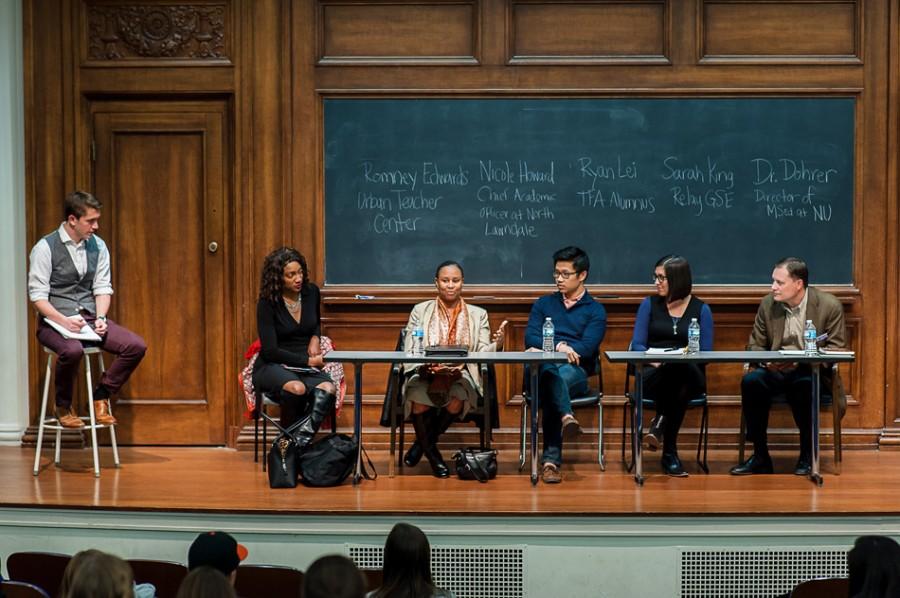Panel of experts discuss national education reform
Education experts speak Wednesday in Harris Hall about the impact of educational reform across different fields. The panel was hosted by Northwestern’s chapter of Students for Education Reform, which aims to inform students about changes in education policy and how it affects local schools.
October 30, 2014
Five education experts spoke in a panel discussion Wednesday evening addressing education reform, including establishing a standard curriculum for students.
The panel, held in Harris Hall, drew about a dozen attendees. Coming from a variety of fields education, the panelists included SESP Prof. Tim Dohrer, director of Master of Science in Education at Northwestern; Nicole Howard, principal at Chicago’s North Lawndale College Prep High School; Ryan Lei, an alumnus of Teach for America and a third-year psychology graduate student; Sarah King from the Relay Graduate School of Education; and Romney Edwards, national recruitment and selection specialist for the Urban Teacher Center.
The panel was sponsored by NU’s chapter of the national nonprofit Students for Education Reform, which aims to help college students become advocates for fair education policy. NU’s chapter, which was started three years ago, focuses on increasing awareness about local and national educational issues, said Weinberg senior Jack Hopper, the group’s co-president.
Wednesday’s discussion covered a breadth of topics including teacher preparation programs, standardization of curricula and legislation such as the No Child Left Behind Act, which supports education reform on a national scale.
The panelists spoke largely in favor of reforms such as the Common Core, which sets ideal standards for student achievement after each grade and standardized testing.
“I’ve been really shocked by how widely accepted the Common Core is,” Dohrer said. “There are not too many times in the history of education when you can point to a time when 40 states have gotten behind something.”
Some panelists lauded these reforms for giving teachers flexibility to innovate and experiment with their lesson plans. However, the speakers noted that such creativity should not stray too far from a school’s standards.
“It has to be aligned,” Howard said. “A house divided just can’t stand.”
Dohrer in particular pointed to the shortage of teachers as the primary problem in education. Dohrer and other panelists spoke against the notion that teaching does not provide an adequate income. He pointed to the average teacher’s starting salary of $36,000 a year as evidence to the contrary.
However, panelists emphasized there are other reasons to pursue a career in education.
“The passion component, though, is actually crucial,” Lei countered. “You can throw money at a problem but if you get teachers who don’t want to teach, you just have people with a lot of money standing in front of a classroom.”
SESP sophomore Bella Sandoval, who attended the event, said she has wrestled with the idea of being a teacher because of the issues the panelists addressed.
“It’s been kind of difficult to reconcile my lofty goals of success with teacher salaries and the challenges teachers face,” she said after the panel. “Hearing people who are kind of experts in the field discuss that was really enlightening and kind of made me think more critically about what my goals are after Northwestern.”
Email: [email protected]
Twitter: @marissahpage


